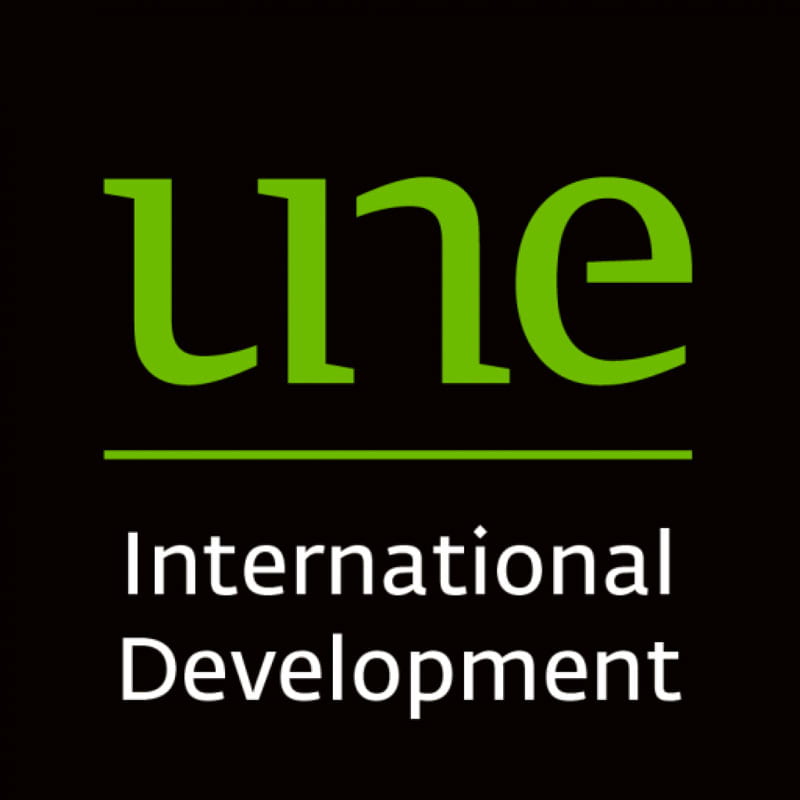Dr. Christina Kenny with members of the Pillars of Kibera Women’s Group.
Dr Christina Kenny is a lecturer in sociology at the University of New England. Based in Armidale, she moved here in 2015 with her partner Dr Matthew Allen who also works at UNE in the Criminology school. At the time, Christina was in the finishing stages of her PhD and had just returned from a 4-month field trip to Kenya.
Christina frames her work as being a ‘critical friend’ to human rights, and says “Critical friends love you enough to tell you when you are making a mistake and this informs the way that I approach international rights and development. In my PhD thesis I asked why so little real-world progress had been made on women’s rights in Kenya despite the significant time, effort and money that had gone into them. While there was relatively widespread knowledge of the rights framework and organisations such as UN Women, critical indicators like the maternal death rate and the incidence of serious domestic violence were still very high. I wanted to develop an understanding of why this disconnect existed.”
In her post-doctoral research Christina remains focused on Kenya and has begun working with several queer women’s organisations in Nairobi and Kisumu. Her project is in the early phases, and during a research trip in late 2019 she began exploring oral histories and cultural understandings of homosexuality with the aim of developing local language educational materials that support the rights of queer Kenyans in close collaboration with local Kenyan organisations.
As an arts and then law student, Christina was struck by the influence of critical story telling and the ability of close narrative analysis to uncover multiple truths. She says “The way stories are told affects cultural identity. Groups of people might be represented as victims or perpetrators and this has real impacts on everyday activities and the way people live their lives.
Studying history taught me how to deconstruct a text and study linguistic choices, how to analyse why things are said in a certain way and what the impact of that is.”
Her subsequent law degree piqued Christina’s interest in human rights and she spent eighteen months working for the Australian Human Rights Commission
and then another 6 months working in the Women’s Legal Centre in Cape Town South Africa.
and then another 6 months working in the Women’s Legal Centre in Cape Town South Africa.
The decision to spend time in Africa was based on a desire to challenge herself and step out of her comfort zone, perhaps a dose of the ubiquitous antipodean sense of adventure. However, Christina’s continuing devotion to Kenya has been no accident. In selecting a PhD topic Christina was pragmatic. While she found South Africa fascinating there was already a dynamic body of research and much like Australia, no lack of home-grown scholars. Kenya by contrast faced many gaps in terms of resourcing and academic freedom.
“Working for government and studying in Australia, my feeling was that we have all the researchers we need, we have a very well-educated population, increasing numbers of people from diverse backgrounds researching their own communities and across communities and we should have enough money to support sustainable social justice research. Whether we do or not isn’t a question of some kind of economic lack or conflict, it’s political. What Australia needed was lobbyists to convince people of the value of academia and I didn’t want to be a lobbyist. I wanted to find somewhere I could research where that research contribution itself would be useful.”
Christina knew she had to select a region and topic that would be sustainable, one that would remain interesting and viable. Kenya ticked many boxes. As a former British colony, the Kenyan archives were mostly in English. Kenya did not host some of the more destabilising civil conflict found in other parts of the continent, and offered the opportunity to learn Swahili, a language spoken across several African countries. Importantly, Kenya is also a majority Christian country and though not practicing, Christina felt her own Christian background would provide a basis upon which to gain a foothold in the cultural world of the country.
Working in Africa while based in regional Australia has been challenging and Christina credits social media platforms like Whatsapp and Facebook for enabling her to sustain a level of connectivity from a distance that would not have been possible ten years ago.
Christina’s PhD research was partially funded by a Georgina Sweet Fellowship awarded through the Australian Fellowship of Graduate Women, and more recently she has also benefited from the David Phillips Travelling Fellowship through the Australian Academy of Humanities, and a UNE Early Career Research grant which funded her latest 2019 research trip.
When she does travel to Kenya, Christina makes sure she spends as long as possible in community, establishing and developing relationships that can support her research when she returns home.
On the teaching side Christina is excited about a new course she has developed with Dr Jennifer Hamilton (English) and Dr Felicity Joseph (Philosophy), SOCY120 Introduction to Gender Theory. It’s an interdisciplinary unit built around the three women’s specialities. Christina teaches post-colonial gender and sexuality, Jennifer brings her expertise in eco-feminism and literary criticism while Felicity explores philosophy and the origins of gender and feminist thought the European philosophical tradition.
The course ran for the first time in Term 1 2020 and will run again in Term 1 2021. SOCY120 compliments units across Sociology including SOCY393 – The Body in Society, and SOCY382- 21st Century Sex: Gender, Desire and Social Change; and PHIL308 Friendship, love and sex.

